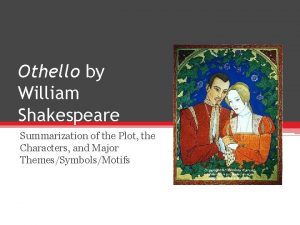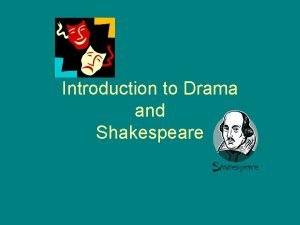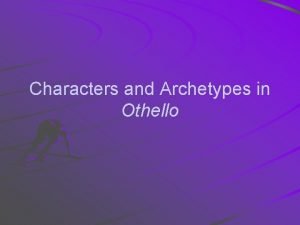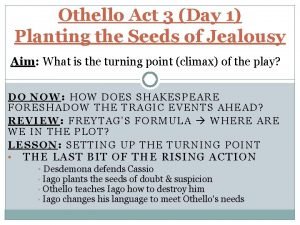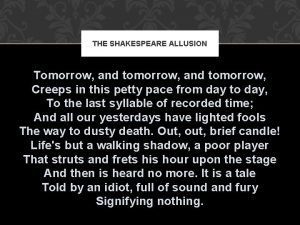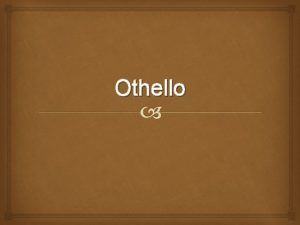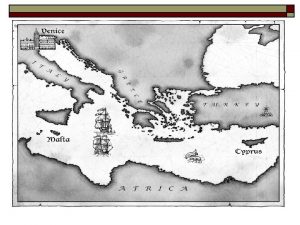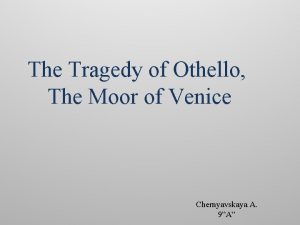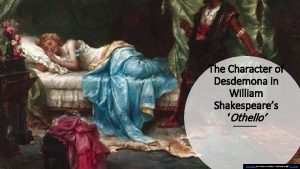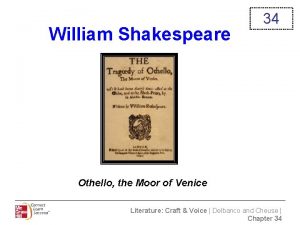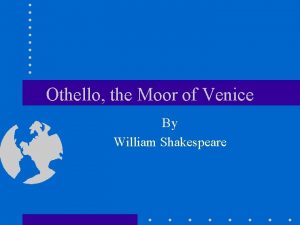OTHELLO William Shakespeare Othello and Desdemona in Venice










- Slides: 10

OTHELLO William Shakespeare "Othello and Desdemona in Venice" by Théodore Chassériau (1819– 56)

ACT III, SCENE III, 165 -171 IAGO: O, beware, my lord, of jealousy; It is the green-ey'd monster, which doth mock The meat it feeds on. That cuckold lives in bliss, Who, certain of his fate, loves not his wronger: But O, what damnèd minutes tells he o'er Who dotes, yet doubts, suspects, yet strongly loves! OTHELLO: O misery!

“O, beware, my lord, of jealousy” IAGO warns THEMES: Jealousy and Manipulation OTHELLO not to be a jealous man, but to guard against his JEALOUSY even as Iago is doing all he can to feed it Iago is manipulative: he is manipulating Othello into believing that Desdemona has been unfaithful: she is cheating with Cassio he is going to make Othello insane with jealousy, and all the while, he’s going to convince Othello that between all the betrayal playing out around him, he can always trust his loyal friend Iago. IRONY: true statement delivered under entirely false pretences Laurence Fishburne and Kenneth Branagh as Othello and Iago respectively, in a scene from the 1995 film version of Othello.

“It is the green-ey’d monster…” METAPHOR: Iago compares jealousy to a GREEN-EYED MONSTER shows how destructive, vicious, frightening and powerful jealousy can be Renaissance Englishmen often paired colors with emotions or personal qualities: green is emblematic of jealousy and of envy

“…which doth mock The meat it feeds on”. The sentence suggests that if Othello gives into jealousy, it will eventually destroy him DOTH: “does” (from the Early Modern English: doeth doth = does); MOCK: from “to mock” = “to make fun of”; THE MEAT IT FEEDS ON: refers to Othello’s imagination which is the “meat” jealousy feeds on until it ruins the jealous man Iago is telling Othello to beware of his jealousy because it messes with your mind as it does in Othello’s state of mind is tragically becoming infected by Iago's lies.

The phrase «GREEN EYED MONSTER» is a popular expression to denote jealousy and is still used today to express the dangers of uncontrolled jealousy in relationships. It is also quoted in the other Shakespearian play “The Merchant Of Venice”. It underlines the contemporaneity of Shakespeare, although he is a Renaissance poet It underlines that some expressions you use nowadays come also from the Shakespearian plays Other common sayings coined by Shakespeare: https: //traditionaltoursuk. com/literary/common-sayings-made-famous-shakespeare/ http: //mentalfloss. com/article/60264/21 -phrases-you-use-without-realizing-youre-quotingshakespeare

“That cuckold lives in bliss, Who, certain of his fate, loves not his wronger: But O, what damnèd minutes tells he o'er Who dotes, yet doubts, suspects, yet strongly loves!” CUCKOLD: a man whose wife is unfaithful. It comes from the cuckoo bird, alluding to its habit of laying its eggs in other birds' nests. Iago tells Otello that if a cuckold knows for sure that he is being cuckolded by somebody, he can hate the person who is cuckolding him. But he says that you have to also think of the unhappiness of a man who worships his wife, but has to doubt her faithfulness. He suspects her cheating, but still loves her. The sentence puts into focus the typical Medieval fear of cuckoldry: men were particularly prone to suspect their wives.

The fear of cuckoldry Cuckoldry in Shakespeare: an act of adultery committed by a married woman against her husband Common theme in Shakespeare’s plays and in Medieval and Renaissance English literature Widespread fear in English society during the Middle Ages and Renaissance Men often regarded their wives as possessions and they were prone to suspect their wives’ faith The social perils of cuckoldry were severe. Cuckoldry was a threat to social status and even masculinity: it ruined a man's credit. To be cuckolded by another man was to be emasculated or effeminized Being a cuckold meant that a husband's masculinity had been destroyed In Othello: Iago plays on Othello’s fear that Desdemona is cuckolding Othello by having sex with Michael Cassio.

Other explicit references of cuckoldry in the play: IAGO to RODERIGO: … If thou canst cuckold him [Othello], thou dost thyself a pleasure, me a sport. (Act 1, Scene 3) Iago is persuading Roderigo to bring down Othello. It will have two advantages: Roderigo will get Desdemona and, since Iago hates Othello, it will be a joy for him watching Othello’s downfall. OTHELLO: I will chop her into messes! Cuckold me? (Act 4, Scene 1) Othello is filled with rage at the idea that Desdemona has made him a cuckold. EMILIA to DESDEMONA: . . who would not make her husband a cuckold to make him a monarch? [if cuckolding him means giving him command of the whole world] (Act 4, Scene 3) Iago’s wife Emilia is discussing with Desdemona about marriage and fidelity. While Desdemona is absolutely devoted to love and marriage, Emilia says that infidelity is justified if there is something substantial to gain from it.

